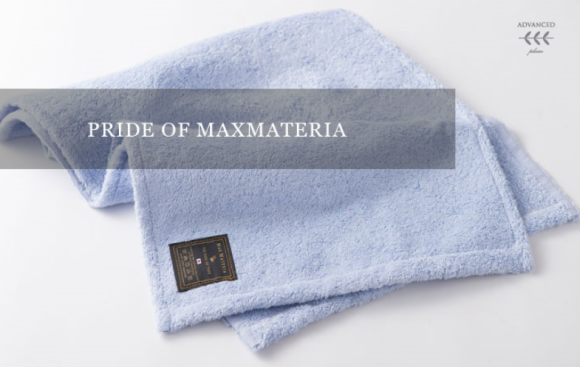
A good towel is always nice to have, especially in a country like Japan where bathing is a hobby, hand dryers and paper towels are largely nonexistent in public restrooms, and the three to five months a year of blazing heat and sweltering humidity will make you itching to wipe off all that sweat.
Yes, it’s hard to overstate the value of a good towel, though some might say Japanese textile maker INI is coming close with its 5,000-yen (US $49) bath towels. That price, though, gets you a towel unlike any that’s been made before.
INI’s Maxmateria line of towels gets its special quality from its unique material, called Soalon. Developed by Mitsubishi Rayon, Soalon is a semisynthetic fiber made with wood pulp and cellulose. This combination gives Soalon a certain amount of natural moistness, making it extremely smooth to the touch, even as the fabric exhibits such incredible absorbency that testers claim it dried their hands with just a few light pats.
INI sees no need for false modesty about their new product, with advertising billing it as “The highest quality towel, created by a towel sommelier,” which is an actual title one can obtain in Japan (although, in keeping with Japan’s….”creative” ways of using foreign loanwords, “sommelier” here just denotes a certified expert on the subject in general, and not its merits as a beverage).
The towel sommelier referred to is INI’s president, Tomonori Nanbu. Creating the Maxmateria towels wasn’t as simple as calling up Mitsubishi and ordering a few truckloads of Soalon, however. As the first company to produce towels with Mitsubishi’s new wonder material, INI ran into a number of roadblocks. Nanbu mentions that for the dying process, Soalon has to be heated to 120 degrees Celsius (248 Fahrenheit), as opposed to the 100 degrees needed with cotton, and the development team initially ran into difficulties weaving the semisynthetic fiber.
Only a select few processing plants in Japan had the necessary technical capabilities, and Nanbu himself made the trip to the candidate facilities for face-to-face negotiations. “The weaving technique had to be precise, down to the millimeter,” he recalls. “It was tough on us, mentally, since we didn’t even know if it would be possible to do what we’d set out to accomplish.”
The team kept at it, though, and in March, the first shipment of Maxmateria towels were sent to retailers. Although the company plans to expand the lineup in the future, currently four types are available, which are (in decreasing size) a bath towel, face towel, “guest towel,” and handkerchief-sized hand towel.
With prices ranging from 1,200 to 5,000 yen ($11.73 to $49), they aren’t the cheapest towels you can buy, but already customer testimonials are popping up saying they’re more than worth it. “It’s such a good towel I want to take it with me when I travel,” gushed one satisfied Maxmateria user. “I bought one for myself, but my daughter liked it so much, she ended up taking it for herself,” reported another.
These glowing reviews no doubt please Nanbu, but they certainly don’t surprise him. “Towels made with this material didn’t exist until now….so I expected these kinds of reactions,” he said, matter-of-factly.
Being someone whose livelihood is tied up in towel-making, Nanbu himself feels the prices are reasonable. “Like fine food or furniture, there’ a joy and comfort that comes from using quality textiles,” he asserts.
We have to admit, he’s got a point. And while you might be tempted to take the 5,000 yen the INI charges for one of its special bath towels to the hundred yen shop and buy 50 cheap substitutes, at least with the Maxmateria, you won’t have to worry about it taking up all of your linen closet space.
Source: Excite News
Top images: Maxmateria Facebook page
Insert images: Maxmateria website